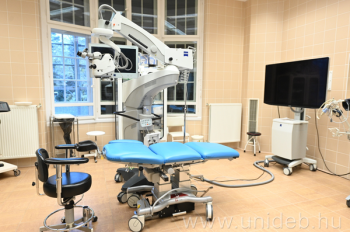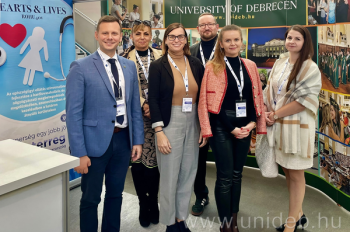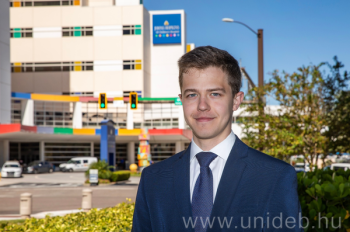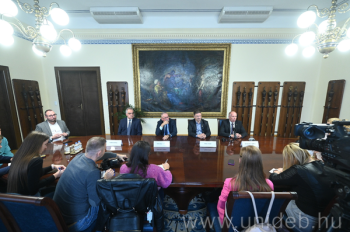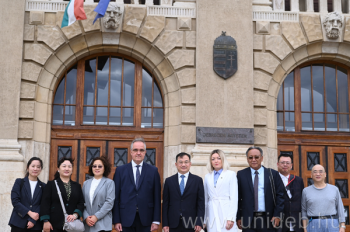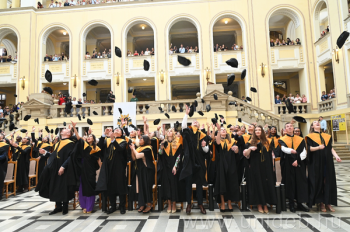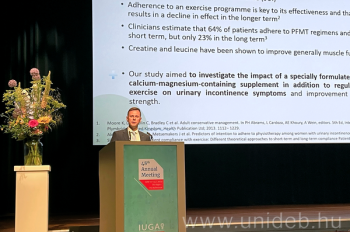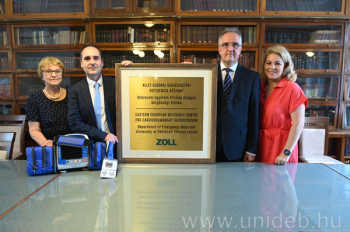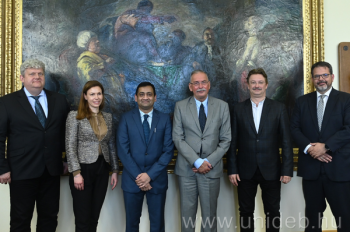In the new operating theatre at the Eye Clinic of the University of Debrecen’s Clinical Centre, state-of-the-art high-tech equipment is now used to perform retinal surgery in a safer way and in shorter time. The new operating theatre was inaugurated on Thursday.
Hírek Kenézy Gyula Campus címkével
The Clinical Centre of the University of Debrecen has won the title of European Model Project for a program aimed at improving the quality of patient care in the prevention and treatment of cardiovascular and gynecological diseases. The project representatives were also invited to a conference organized by Széchenyi Program Office, where the best trans-border Central European projects could be presented.
Regő Baráth Benjámin reported on the results of his research on human placental macrophages at the 12th Annual JHAC Research Symposium at the Johns Hopkins University All Children's Hospital in the United States. The sixth-year medical student was the youngest speaker at the congress.
The University of Debrecen has established a new organisational unit for the management of disaster medicine and the operation of mobile medical teams in disaster and war zones, as well as for the management of domestic charitable and support programmes. University leaders informed journalists about the planned tasks and objectives of the centre on Friday.
The issues discussed at the meeting held in the Rector's Office of the University of Debrecen on Tuesday included points of connection between the health care systems of the University of Debrecen and the University of Tibet, the possibilities of future cooperation and the organization of emergency and cardiovascular care. The Tibetan delegation was received by Zoltán Szabó, Vice Rector and President of the Clinical Centre and Okszána Kiszil, Director of Coordination and Strategy.
As many as 159 graduating students of the Faculty of Medicine took their Hippocratic Oath on Saturday at a ceremony held within our university's Inner Courtyard. At the ceremonial council meeting of the doctoral ceremony, 90 Hungarian and 69 foreign doctors received their diplomas.
At the Obstetrics and Gynecology Clinic of the University of Debrecen Clinical Center, they developed a dietary supplement that is the only one in the world that supports pelvic floor exercise as effectively as possible, so it can help overcome incontinence without surgery or medication. The Debrecen innovation was presented at the International Urogynecology Congress in The Hague in June.
After several months of testing, the complex resuscitation device of one of the world's leading American defibrillator manufacturers, also supporting ambu balloon ventilation, which can be used to provide more efficient emergency care for critically ill patients, has finally arrived at the Emergency Clinic of the University of Debrecen Clinical Center. The manufacturing company has asked the Emergency Clinic to be a reference center for resuscitation in Eastern Europe. In addition to patient care, the device also supports teaching and research work.
Young obstetrician-gynecology specialists from the University of Debrecen have successfully participated in an international laparoscopic suturing contest. In the professional program called Winners Meeting, the team from Debrecen has finished second.
The University of Debrecen and GE HealthCare have concluded and signed a research and development agreement to support radiotherapy treatment. The Department of Oncoradiology is the first institution in Europe to test the GE HealthCare software that constitutes a system of highly complex radiation therapy procedures. As for now, the application is only used in a testing environment but, once it gets involved in patient care, it will be able to provide more effective oncoradiology treatments.
